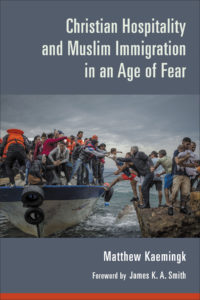 Christian Hospitality and Muslim Immigration in an Age of Fear Matthew Kaemingk (Eerdmans) regularly $28.00; our 20% off sale price, $22.40.
Christian Hospitality and Muslim Immigration in an Age of Fear Matthew Kaemingk (Eerdmans) regularly $28.00; our 20% off sale price, $22.40.
TO ORDER, JUST USE OUR ORDER LINK BELOW WHICH WILL TAKE YOU TO OUR BOOKSTORE’S WEBSITE AND OUR SECURE ORDER FORM PAGE.
Christian Hospitality and Muslim Immigration in an Age of Fear by Matthew Kaemingkis is an exceptional new book offering careful scholarship, theology, political science, history and storytelling in a combination that will reward any serious reader and will especially delight those wanting to deepen their understanding of uniquely Christian contributions to public policy. It is so well done, so thoughtful and well-written, and it covers so much ground and offers such a thrilling, hopeful thesis, that I can confidently announce that it is already, I am sure, one of the Best Books of 2018.
With the government shut-down looming as I write we know that debates about immigration are on the front burner. Good people hold different general attitudes about immigrants (and also about those of other religions) and even those Christians trying to take seriously the Biblical texts about welcoming strangers and doing justice will disagree about policy details. But anyone who cares about our world should be paying attention. There is no doubt that in our globalized world our societies are becoming more multi-ethnic; there is not only more ethnic diversity but there is cultural diversity while even conflicting religions and ideologies bump up against one another, understandably increasing our anxiety. That Kaemingk names this an “age of fear” is not mere rhetoric.
That we fear others, especially Muslims (with the stereotypes of terrorists and anti-democratic zealots) is a huge piece in the contemporary landscape. To help us figure out a truly Christian proposal for how to navigate the complexity of secular-Christian-Muslim relationships in the changing West is a gift, and Kaemingk’s detailed study — based on the fascinating history, the glorious ups and horrific downs of immigration in Holland — is a gift that could truly break new ground.
Break new ground?
 A theologically-informed case study of Christian-Muslim relations in Holland, first studied at an evangelical seminary (Kaemingk wrote his PhD thesis under Richard Mouw at Fuller Theological Seminary) breaking new ground? How can that be? Aren’t the viewpoints and positions pretty much set in stone at this point? Isn’t that partially why our government is about to shut down –there are progressives and conservatives, those who seem idealistic and even romantic about “we’re all one” pro-immigration generosity and those who are wary and often xenophobic, if not out-right nativist, insisting we be realistic about walls and borders and laws of exclusion? Of course there are some (perhaps many) who are somewhere in the middle-ish on this continuum, willing to compromise between the liberal left and the conservative right, but almost everyone – everyone! – seems to be caught on the horns of this binary polarity, assuming this ping-pong argument back and forth between those that favor greater inclusion and social justice and those that favor greater prudence and law & order. Invite ‘em in! Keep ‘em out! We’re all one! We’re in a clash of civilizations!
A theologically-informed case study of Christian-Muslim relations in Holland, first studied at an evangelical seminary (Kaemingk wrote his PhD thesis under Richard Mouw at Fuller Theological Seminary) breaking new ground? How can that be? Aren’t the viewpoints and positions pretty much set in stone at this point? Isn’t that partially why our government is about to shut down –there are progressives and conservatives, those who seem idealistic and even romantic about “we’re all one” pro-immigration generosity and those who are wary and often xenophobic, if not out-right nativist, insisting we be realistic about walls and borders and laws of exclusion? Of course there are some (perhaps many) who are somewhere in the middle-ish on this continuum, willing to compromise between the liberal left and the conservative right, but almost everyone – everyone! – seems to be caught on the horns of this binary polarity, assuming this ping-pong argument back and forth between those that favor greater inclusion and social justice and those that favor greater prudence and law & order. Invite ‘em in! Keep ‘em out! We’re all one! We’re in a clash of civilizations!
Can’t there be a better way?
Professor Kaemingk, by digging deep into the social thought of an influential Dutch theologian who became the Prime minister of Holland in the early 1900s, Abraham Kuyper, discovers a whole new social theory that provides an alternative to the classic left versus right continuum, a model of approaching the meaning of public justice – and in this case questions about immigration, especially Muslim immigration – that can break the impasse of our limited political imagination and offer a model that some call principled pluralism.
Christian Hospitality and Muslim Immigration in an Age of Fear is the most careful study of immigration policy I have ever read and more importantly, it is the most forward-thinking in coming up with fresh ideas for our current debate.
Dr. Kaemingk’s fresh ideas, though, are based on this uniquely Christian, theologically-informed, non-theocratic, view of Christian politics developed by Kuyper’s political party more than a hundred years ago that made room for varying ideologies and worldviews in the public square and in a society understood as diverse.
It is a social theory called principled pluralism and it created in early 1900s Holland structures and policies of publicly-funded schools and media outlets and civic associations for Jews, liberal secularists, socialists, Catholics, and Protestants, based on this notion that God desires all to be able to live out their deepest convictions in all areas of life peaceably with others; the God-given task of the state, according to pastor-theologian-statesman Kuyper, is to assure cultural flourishing for all, balancing various communities claims and needs in a social architecture of public justice for all. It was proportional – not “winner takes all” – and tried to elevate minority communities to equitable status so the majority (formerly Protestant, and then secularized liberal) wouldn’t run roughshod over those with other deeply held worldviews, ways of life, and cultural practices. Newcomers were not made to “assimilate” to some dominant cultural value system but were encouraged to find “common grace for the common good.” Obviously a pluralistic approach to society and the role of the state is something different from progressive liberalism where eventually everyone has to adopt to the idealistic views of the secular left and it is likewise different from traditionalist views of conservativism which often tends towards exclusion and tribalism. This Christian view of pluralism offers visions of and structures for “liberty and justice for all.”
Well, that sounds fine, you may say, but what if one faith community wants to do harm to another? Do pluralists think it’s fine to have a neo-Nazi political party? Should we affirm those who want to teach their children that girls ought not be educated? How much room for flourishing do we give to varying faith communities? Are all ideologies to be welcomed? Can we open up and give room to everyone to live out their convictions without leading to cultural mayhem?
That is the question that Holland faced as it transitioned from a predominantly Reformed Protestant hegemony to a pluralism innovated and facilitated by the Christian political party and “common grace” worldview promoted by Kuyperians in the early 1900s. This pluralism where all were welcome and not expected to assimilate to some allegedly neutral and value-free civil religion was something new on the world stage – not a hegemony nor a “melting pot” but a patchwork quilt – and Kaemingk tells us much about the creation and sustainability of that framework.
This arrangement was sometimes called “pillarization” because each worldview or ideological community developed in their own ways, along “pillars” that, because they were strengthened and affirmed, lived peaceably beside one another. Many have offered critique of “pillarization” (both theologically and politically) but, in any event, it came crumbling down in a tidal wave of modernism and progressive liberalism in the 1960s. Holland quickly, almost inexplicably, shifted from a respected, pluralistic, healthy culture to one of the world’s most freewheeling and painfully liberal, with Kuyper’s beloved Amsterdam becoming one of the world’s most licentious cities in all of Europe.
What can we learn about Muslim-Christian relationships from this flamboyant era of this dramatic story? What can we learn about public theology and Christian political theory by looking at Dutch pluralism (and how it was overtaken by a secularized hegemony that started out eagerly welcoming of others but has now turned very hostile to Muslims?) Might the Kuyperian model offer us something today – in Europe and in the US – as we try to find ways to get beyond our current impasse and Band-Aid proposals about the immigration crisis?
There is more to this story of the formation of pluralism and its breakdown, though, which makes it even more dramatic and urgent. Kaemingk has spent much time with the Dutch and he offers a well-told exploration of immigration and inter-faith relations in Holland – from welcoming and carefully pluralistic, to recklessly romantic, to, now – get this – being one of the most virulent anti-immigration nations in the West.
As with the rise in anti-Muslim sentiment and awful persecution of Muslim citizens (and their mosques and markets) in the US after 9-11, Holland’s attitudes took a decisive and 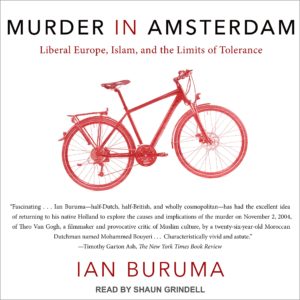 dangerously dark shift after the brutal murder of the descendent of their beloved Vincent Van Gogh in 2004. Theo Van Gogh was a vulgar and provocative anti-Muslim spokesperson, working with the harshly anti-Muslim convert to secularism, Ayaan Kirsi Ali (whose books Infidel and Nomad are international best sellers) and the brazenly hostile anti-Muslim showman, Geert Wilders.) A militant, Islamic extremist viciously stabbed and decapitated Van Gogh. Another anti-Muslim, militantly secular populist organizing a nativist political party, Pim Fortuyn, had been murdered by Muslim terrorists less than two years previous.
dangerously dark shift after the brutal murder of the descendent of their beloved Vincent Van Gogh in 2004. Theo Van Gogh was a vulgar and provocative anti-Muslim spokesperson, working with the harshly anti-Muslim convert to secularism, Ayaan Kirsi Ali (whose books Infidel and Nomad are international best sellers) and the brazenly hostile anti-Muslim showman, Geert Wilders.) A militant, Islamic extremist viciously stabbed and decapitated Van Gogh. Another anti-Muslim, militantly secular populist organizing a nativist political party, Pim Fortuyn, had been murdered by Muslim terrorists less than two years previous.
As Kaemingk writes,
Between 2001 and 2006, a perfect storm of terrorist attacks abroad, a horrific assassination at home, a drama-thirsty media, and a charismatic cadre of populist politicians came together to transform Dutch political culture. This potent combination of characters, events, and cultural forces combined to completely burst the dam of political correctness and benevolent paternalism that had been built in the Netherlands during the late twentieth century. In the space of a few short years all of the pent-up fears, prejudices, and frustrations of the Dutch people were released in a series of cathartic outbursts against Muslim immigrants. The public debate quickly became Islamicized, focusing specifically on the religion of immigrants as the root of the problem. By 2006 67% of Dutch citizens were convinced that there was a clash between Dutch culture and Islam. [Citing a book called When Ways of Life Collide: Multiculturalism and Its Discontents] he notes, ‘More than half believed Islam was a threat to Dutch national identity. Within “every political party there was a faction especially ready to respond negatively to minorities’.
Matt Kaemingk’s study of this sudden rise of animosity in Holland is striking, and the chapter “Marginalizing Islam” explores two kinds of popular sentiment and response to the conflicts between liberal culture and Islamic fundamentalism – both the ugly sort of “muscular liberalism” represented by Fortuyn, Wilder, Ali, and Van Gogh, and the “softer assimilation movement” that held sway over Dutch liberalism. In this, we begin to see the bi-polar continuum — liberalism versus conservatism – that developed in Holland even as it was developing all over Europe, and, soon enough, in the US as well.
First we saw the political debates about women wearing hijab in public and outspoken condemnation of the building of mosques and then disturbing trends like the hostile rhetoric during the Brexit vote and the rise of neo-Nazi parties in Europe. These are not unrelated to the controversies of our ugly political situation here, with President Trump’s seemingly anti-Muslim immigration ban and his disturbing choice to allow Steve Bannon and his alt-right racism into the inter sanctum of the White House. Kaemingk’s reporting about anti-Muslim sentiment and policy that started to emerge in Europe nearly a decade ago is important for us here, now.
But we also see liberal push back to the hostility of the far right. The response to the alt-right has often been led by faith-leaders; mainline denominational folks and Roman Catholics and, increasingly, evangelicals, have been outspoken about the Biblical call to justice and the theological imperatives of hospitality. (I have made known my own sympathies for those advocating for immigrants, have been involved myself in years of work on asylum reform and political protest, and know many over the years who have done charitable work in refugee resettlement and the like.)
As glad as I am for the good voices from the so-called Christian left and the progressive evangelicals who are being (in my view) Biblically faithful and Christ-like on this issue, it nonetheless seems notable that many of our best advocates frame the issues in terms of the old, classic liberal versus conservative paradigm. We say we are non-partisan, but most faith-based voices sound pretty much like their secular counterparts, either Democrats or Republicans (and usually show disdain for those with whom we disagree as well, just like the pols do these days.)
Kaemingk’s astute study of how those in The Netherlands navigated this shift from open-minded, if naïve, progressive views to fearful and often nasty nativism has huge insights for us in the US.
His exploration of how the evangelical and Reformed Kuyperian political vision of principled and structural pluralism shaped, for more than half a century, a generous and wise and prudent sort of civic culture that resisted the excesses and missteps of other models is instructive, to say the least. It is, I’d say, a proposal that cries out to be understood, 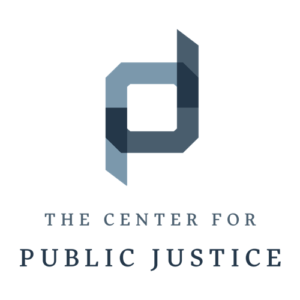 discussed, adjusted, and worked out. That our friends at the Center for Public Justice in Washington DC are hosting the “book launch” on Capitol Hill this week makes me happy and sends a signal that truly Christian thinking that does more than parrot the conventional options really could offer new ways to frame and new ways to consider what justice requires of us in this conflicted topic. May just such “third ways” be considered, and may this book help stimulate good thinking and new perspectives.
discussed, adjusted, and worked out. That our friends at the Center for Public Justice in Washington DC are hosting the “book launch” on Capitol Hill this week makes me happy and sends a signal that truly Christian thinking that does more than parrot the conventional options really could offer new ways to frame and new ways to consider what justice requires of us in this conflicted topic. May just such “third ways” be considered, and may this book help stimulate good thinking and new perspectives.
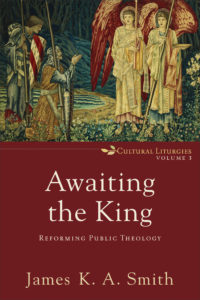 Okay, so that’s my pitch for why Christian Hospitality and Muslim Immigration is so important. Drawing on a broad case study on the ups and downs of Holland’s approaches – including the era shaped by Kuyper’s Christian political party and its principled pluralism — Matthew Kaemingk gives us a great example of uniquely Christian thinking about political theology.
Okay, so that’s my pitch for why Christian Hospitality and Muslim Immigration is so important. Drawing on a broad case study on the ups and downs of Holland’s approaches – including the era shaped by Kuyper’s Christian political party and its principled pluralism — Matthew Kaemingk gives us a great example of uniquely Christian thinking about political theology.
Perhaps it should be the next book to read after the Hearts & Minds “Best Book of 2017” by James K.A. Smith, Awaiting the King: Reforming Public Theology.
It is no surprise that James K.A. Smith himself offers a fabulously interesting and well-written foreword.
Smith, too, is struck by Kaemingk’s “third way” approach:
Kaemingk challenges the failure of the theological imagination to really grapple with difference. Dominant schools of thought are locked in a binary imagination that either underwrites hegemony or blithely diminishes difference in the name of a vague sense of inclusion. The failure of Christian theology to articulate a complex, nuanced, affirmation of plurality and difference too often translates into heretical nationalisms or naïve, progressivist assimilationism. Both have failed, Kaemingk shows. Thus he points us to a neglected stream of Christian thought that has pluralism encoded in its very DNA.
Yep, that’s what I’ve been trying to say.
Kaemingk’s book is neither left nor right, nor a boringly moderate-middle approach. Christian Hospitality and Muslim Immigration in an Age of Fear proposes fresh frameworks, leading to new ground, based on this old theory from a century ago, built up among Dutch neo-Calvinists in the early 1900s. And, wow, what an amazing proposal, bravely offered in this remarkable, detailed and very informative book.
Jamie Smith likes the book for other reasons, too, beyond how it helps us get beyond the typical debate between conservatives and liberals. Listen again to this, from Smith’s foreword:
So this singular book does two things at once: it shows the real-world relevance of Reformed public theology while also making a constructive contribution to a pressing question that continues to dominate the headlines. This isn’t just more prolegomena and throat-clearing: this is a Christian ethicist tackling a real, difficult, practical question with the resources of theology. Kaemingk doesn’t pretend to be a policy expert, nor does he take his academic credentials to be a license to freelance as an activist. The (limited but constructive) role of the ethicist and theologian here is diaconal: offered in service of those involved in legislation, policy, NGOs, activism, and the quiet, quotidian works of mercy that constitute the church’s hospitality.
Smith alludes to something else that is strong in the book. Some Christians, understandably, are concerned about Kuyperian talk about a “Christian” view of politics, as if what is meant is some Christian takeover, some theocracy, some harsh triumphalism and power-mongering in the name of God. (As Kaemingk notes, saying that Christ is ruling the world doesn’t mean that Christians are running things, let alone running things for their own privilege.) Kuyper’s early 20th century views of political toleration, religious liberties for all, and structural pluralism, gives us a clue that his understanding of a Christian view of the state is one that is generous, welcoming, gracious. In that great Christmas carol “Joy to the World” we sing about Christ ruling the nations, even proving to them “the glories of his righteousness.” But what does that look like? This: “The wonders of his love. The wonders of his love.”
Another way to remind us of this is seen in what Kaemingk does beautifully – he draws on other heavyweight Dutch theologians who influenced Kuyper such as Klaas Schilder and Herman Bavinck who insisted that our social ethics and public theology be Christ-like. Which is to say we must not just promote the Kingship of Christ, but embrace the very character of His Kingship which was one of foot-washing, servanthood, humility. Schilder’s reflection on the Naked Christ – which must have been heart-piercing to his conservative, pietistic, Dutch Reformed congregations in those years – shows us that true Christian cultural engagement is always cruciform, humble, kind, even vulnerable. “Have this mind in you…” Philippians 2 tells us, as it explains Christ laying aside the privileges of his glory and embracing human servanthood. What a King this Jesus is, whose coronation happened while stripped, splayed naked on a cross and whose royal crown was one of thorns!
This section – “Following the Naked Slave-King between Mecca and Amsterdam” — is rich and thoughtful and significant. He then follows up these older theological and pastoral voices with the contemporary theologian Hans Boersma whose remarkable book Violence, Hospitality, and the Cross envisions a way to think about the horrors of the cross as a sign of gracious hospitality. This way of “cruciform hospitality” (as he calls it) offers a “complex discipleship” that moves us deep into the fray of interfaith conflict and service to the marginalized. Anyone who thinks that the teachings of older, orthodox Calvinist theologians are necessarily conservative, socially, or unhelpful as we try to be faithful in our modern times should read this stuff. Kaemingk is careful, here, and finally points us to Christ Himself as the only Redeemer – we do not have to save the world and while the contemporary issues may feel overwhelming, it is not the Christian who must ultimately rescue Mecca or the West.
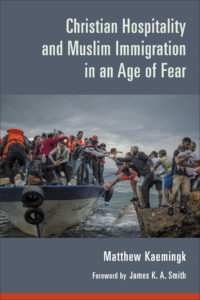
A final word about the book’s structure, to clarify my heart-felt ruminations about it.
Part 1 offers the case study, entitled “Mecca and Amsterdam.” There follows two very strong chapters, “The Myth of Multiculturalism” and “Marginalizing Islam.” He wonders, in a good interlude, what it might look like to offer “A Christian Defense of Islam.”
Part 2 is called “Christian Pluralism: A History.” The chapters here start with one on the emergence of Christian views of pluralism, and then two fascinating studies of Kuyper, explaining his “Deconstruction of Uniformity” and his “Construction of Plurality.” He goes “Beyond Kuyper” in a good interlude which points us in new ways beyond what was developed 100 years ago.
Part 3 looks at the possible future of Christian views of pluralism. Here he calls us to look at Christ and then he offers an amazing – almost surprising, unless you’ve read James K.A. Smith – chapter on the role of worship to help us long for genuine justice and desire honest pluralism. Yes, there is a chapter in here on worshipping well as a resource for nurturing a 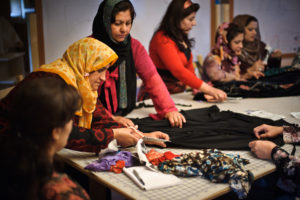 civic mindedness that is generous, just, and that could inspire us to desire the best for our neighbors. Then there is the chapter which is a call to action. He tells stories of women who reached out to Muslim immigrants forming sewing groups; he tells of a Muslim person in Holland who was receive by a right-wing preacher who, despite his conservative politics, knew the Bible told him to show kindness to the stranger, even the enemy. The book is not all political theology and theories of pluralism and stuff about the clashes of ideologies. There is this good stuff about ordinary folks thinking outside the box as they live in ways that today we might call missional.
civic mindedness that is generous, just, and that could inspire us to desire the best for our neighbors. Then there is the chapter which is a call to action. He tells stories of women who reached out to Muslim immigrants forming sewing groups; he tells of a Muslim person in Holland who was receive by a right-wing preacher who, despite his conservative politics, knew the Bible told him to show kindness to the stranger, even the enemy. The book is not all political theology and theories of pluralism and stuff about the clashes of ideologies. There is this good stuff about ordinary folks thinking outside the box as they live in ways that today we might call missional.
Part 4 is very helpful, where Kaemingk explores “Islam and Christian Pluralism in America.” He gives a fine overview of Islam and Christianity in the States, and then offers a chapter called “Muslim Spaces in America.” The closing chapter is called “American Evangelicalism and Islam: The Pluralist Option.” Oh my, this is good, good stuff. It is missional, inviting us to bear witness to Christ’s grace in our neighborhoods and in our attitudes and even in our voting. It combines a robust public theology, a solid evangelical piety, with some great stories of ordinary folks being good neighbors, hospitable, welcoming, servants.
The Epilogue took me by surprise, and it is so rich that readers will be delighted that it was included. It is an extended spiritual reflection on “The Politics of Holy Week.” Very, nicely done, Matt.
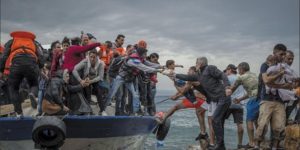 One does not have to look too carefully at the recently-taken photograph on the cover of Christian Hospitality and Muslim Immigration to be reminded of the human drama and tragic nature of those fleeing for their lives, to a safe place, perhaps a new home. As Mr. Rogers used to say, there are always those who help, and, this picture reveals, there are always the innocent involved (do you see the children?) Are some on that boat dangerous, criminals, maybe? Terrorists, even? Of course that is possible. This is real-world stuff, complex, ethically-demanding, full of risk and ache and the possibility of hurt and the possibility of hope.
One does not have to look too carefully at the recently-taken photograph on the cover of Christian Hospitality and Muslim Immigration to be reminded of the human drama and tragic nature of those fleeing for their lives, to a safe place, perhaps a new home. As Mr. Rogers used to say, there are always those who help, and, this picture reveals, there are always the innocent involved (do you see the children?) Are some on that boat dangerous, criminals, maybe? Terrorists, even? Of course that is possible. This is real-world stuff, complex, ethically-demanding, full of risk and ache and the possibility of hurt and the possibility of hope.
But, of course, life is more complex than even this vivid picture. There are cultural attitudes, social institutions, civic organizations, churches, governments, laws and policies. As citizens and neighbors, we have to think about more than the personal and how to be charitable although, as Kaemingk beautifully reminds us, that is a great place to start, and that to which some of us may be mostly called. But we also have to think more about attitudes and culture and institutions and social policy and politics, even. In this “age of fear” and certainly in this particular consequential political season, this kind of a sophisticated, demanding book could be very, very important for us. It is highly recommended as a serious tool for serious citizens in these serious times.
(For the record, I might as well ask out loud a quick question. I wonder why Paul Marshall & Nina Shea do not appear in the otherwise commendably comprehensive footnotes? Marshall is a widely respected Christian political scholar, himself influenced by Dutch neo-Calvinism and a 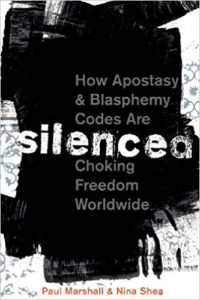 robust advocate for principled pluralism. His book God and the Constitution: Christianity and American Politics (Rowman & Littlefield; $27.95) is excellent in offering a framework for thinking well about politics, and perhaps not as complex as James Skillen’s also rather Kuyperian classic The Good of Politics: A Biblical, Historical, and Contemporary Introduction (Baker Academic; $24.00) which I have discussed often at BookNotes. But Marshall is also one of the world’s leading scholars on some of the civil liberties violations and human rights abuses offered by radicalized Islamists. His 2011 Oxford University Press tome, Silenced: How Apostasy and Blasphemy Codes Are Choking Freedom Worldwide ($35.00) is the definitive book on the subject.(See my review, here.) The “Charlie Hebdo” murders did not happen in Holland, of course, but they paralleled the Van Gogh assassination and illustrate a serious challenge to any ministries of hospitality and reconciliation and the politics of pluralism. I would be eager to hear what the sober Marshall says about the upbeat and hopeful tone of Kaemingk’s good book.)
robust advocate for principled pluralism. His book God and the Constitution: Christianity and American Politics (Rowman & Littlefield; $27.95) is excellent in offering a framework for thinking well about politics, and perhaps not as complex as James Skillen’s also rather Kuyperian classic The Good of Politics: A Biblical, Historical, and Contemporary Introduction (Baker Academic; $24.00) which I have discussed often at BookNotes. But Marshall is also one of the world’s leading scholars on some of the civil liberties violations and human rights abuses offered by radicalized Islamists. His 2011 Oxford University Press tome, Silenced: How Apostasy and Blasphemy Codes Are Choking Freedom Worldwide ($35.00) is the definitive book on the subject.(See my review, here.) The “Charlie Hebdo” murders did not happen in Holland, of course, but they paralleled the Van Gogh assassination and illustrate a serious challenge to any ministries of hospitality and reconciliation and the politics of pluralism. I would be eager to hear what the sober Marshall says about the upbeat and hopeful tone of Kaemingk’s good book.)
AND THIS, JUST OUT THIS WEEK:
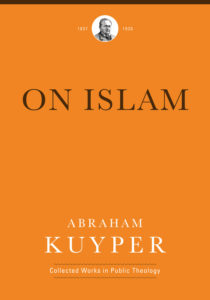 On Islam Abraham Kuyper; edited by James Bratt (Lexham Press) $49.99 As I hope you know we carry all of these recent, quite handsome, large, well-edited and nicely produced, annotated editions of the public theology of Abraham Kuyper. I believe this brand new volume, years in translation, is the first time this matieral has been available in English, and it shows Kuyper’s prescient worldview. He understood the rise of Islam as significant, and he offered what the translators have said were remarkable insights, even if expressed in ways common to European scholars of the early twentieth century. This is not your basic “introduction to Islam” for modern day folks wanting to understand the basic beliefs and practices of your Islamic neighbors or co-workers. It is, however, a remarkable further illustration of the profundity of much of Kuyper’s thought and his interest in global matters, seen through the eyes of a theologian, pastor, and statesman.
On Islam Abraham Kuyper; edited by James Bratt (Lexham Press) $49.99 As I hope you know we carry all of these recent, quite handsome, large, well-edited and nicely produced, annotated editions of the public theology of Abraham Kuyper. I believe this brand new volume, years in translation, is the first time this matieral has been available in English, and it shows Kuyper’s prescient worldview. He understood the rise of Islam as significant, and he offered what the translators have said were remarkable insights, even if expressed in ways common to European scholars of the early twentieth century. This is not your basic “introduction to Islam” for modern day folks wanting to understand the basic beliefs and practices of your Islamic neighbors or co-workers. It is, however, a remarkable further illustration of the profundity of much of Kuyper’s thought and his interest in global matters, seen through the eyes of a theologian, pastor, and statesman.
Here is what the publishers write about it — fascinating, eh?
At the beginning of the twentieth century, famed theologian Abraham Kuyper toured the Mediterranean world and encountered Islam for the first time.
Part travelogue, part cultural critique, On Islam presents a European imperialist seeing firsthand the damage colonialism had caused and the value of a religion he had never truly understood. Here, Kuyper’s doctrine of common grace shines as he displays a nuanced and respectful understanding of the Muslim world. Though an ardent Calvinist, Kuyper still knew that God’s grace is expressed to unbelievers. Kuyper saw Islam as a culture and religion with much to offer the West, but also as a threat to the gospel of Jesus Christ. Here he expresses a balanced view of early twentieth-century Islam that demands attention from the majority world today as well. Essays by prominent scholars bookend the volume, showing the relevance of these teachings in our time.
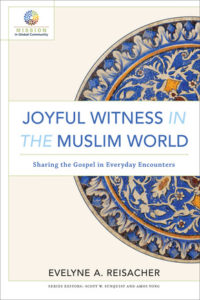 Joyful Witness in the Muslim World: Sharing the Gospel in Everyday Encounters Evelyn A. Reisacher (Baker Academic) $22.99 We stock dozens of books about Christian-Muslim relationships from various theological views and different levels of scholarship from the most serious to the most practical. Since this particular BookNotes post is highlighting a book that is a bit academic, I wanted to list at least one excellent resource for those wanting a good overview of evangelical outreach within the Muslim communities around the world, based on respect and care. This fine author worries about the dehumanization of Muslims in the Western mind, even the demonization of Muslims in some harsh discourse. So she is a caring, reliable voice, and knows very, very much about this topic. This is a great, thoughtful book, serious, but not too scholarly. It was the inaugural title in a series edited by Fuller Theological Seminary’s Scott Sundquest, formerly of Pittsburgh Theological Seminary.
Joyful Witness in the Muslim World: Sharing the Gospel in Everyday Encounters Evelyn A. Reisacher (Baker Academic) $22.99 We stock dozens of books about Christian-Muslim relationships from various theological views and different levels of scholarship from the most serious to the most practical. Since this particular BookNotes post is highlighting a book that is a bit academic, I wanted to list at least one excellent resource for those wanting a good overview of evangelical outreach within the Muslim communities around the world, based on respect and care. This fine author worries about the dehumanization of Muslims in the Western mind, even the demonization of Muslims in some harsh discourse. So she is a caring, reliable voice, and knows very, very much about this topic. This is a great, thoughtful book, serious, but not too scholarly. It was the inaugural title in a series edited by Fuller Theological Seminary’s Scott Sundquest, formerly of Pittsburgh Theological Seminary.
BookNotes

SPECIAL
DISCOUNT
ANY ITEM MENTIONED
20% Off
order here
this takes you to the secure Hearts & Minds order form page
just tell us what you want
inquire here
if you have questions or need more information
just ask us what you want to know
Hearts & Minds 234 East Main Street Dallastown PA 17313
read@heartsandmindsbooks.com
717-246-3333
